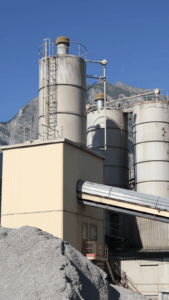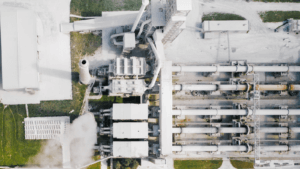CONCRETE EVIDENCE THAT SAMPLING COULD IMPROVE THE PERFORMANCE OF YOUR CEMENT PLANT
Whilst the UK Government is aiming for Net Zero by 2050, the concrete and cement sector is aiming to go beyond Net Zero and become net negative by 2050, removing more carbon dioxide from the atmosphere than it emits each year.
In order to achieve this, the current reliance on fossil fuels needs to be addressed and one way in which this can be facilitated is through the use of Solid Recovered Fuels (SRF) and Refuse Derived Fuels (RDF).
SRF AND RDF IN CEMENT PRODUCTION

SRF and RDF are being increasingly utilised in the production of cement; a development that is set to continue in the coming years. Research shows that the cement industry is in fact highlighted as one of the biggest markets for SRF/RDF in Europe, accounting for about 12 Mton/y of the SRF/RDF produced, to which cement plants and cement kilns contribute for 40% (a consumption of about 5 Mton/y).
Most commonly, SRF and RDF are used as a secondary fuel for co-incineration at cement plants, however there is potential for these alternative fuels to be used as a substitute to pet-coke in the near future as long as they are high in Calorific Value.
WHAT ARE THE BENEFITS?
REDUCING WASTE TO LANDFILL
Waste material is largely being disposed of in economically inefficient ways that are damaging to both the environment and the Circular Economy. The UK alone sent approximately 46 million tonnes of waste to landfill in 2019, an increase of around 1.8 million tonnes from 2018.
The production of SRF from non-hazardous waste materials as a sustainable, high-yield energy source is a more favourable option than sending it to landfill and offers an alternative fuel source for cement production.
ENVIRONMENTAL IMPACT
Using SRF and RDF in cement production would support the global drive to reduce carbon emissions. For example, take the Italian cement industry. They were able to decrease overall CO2 emissions by 8.9% in 2018 compared to 2017, in part by replacing a higher proportion of fossil fuels with alternative fuels and biomass fuels.
Further to a report from the University of Belgrade on cement plants, the report concludes that: ‘where SRF is already used as an alternative fuel, the impact using these substituted fuels have on the localised air quality and the environment would be negligible’ — making the conversion and use of SRF and RDF more than favourable.
IMPORTANCE OF FUEL QUALITY AT CEMENT PLANTS
 Increased application of RDF and even SRF is largely positive, however it can introduce additional inorganic contaminants such as heavy metals and metalloids into the cement kiln that originate from consumer products ending up in the final fuel source.
Increased application of RDF and even SRF is largely positive, however it can introduce additional inorganic contaminants such as heavy metals and metalloids into the cement kiln that originate from consumer products ending up in the final fuel source.
These materials have an inconsistent CV (Calorific Value) and can be harmful if they fuse onto the inside of the burner, causing implications and ultimately, downtime to the kiln — resulting in a drop in production.
Whilst specific limit values for SRF exist, cement companies are relying on SRF and RDF producers to assure quality criteria are met, contaminant concentrations are kept at a low level and produce contaminant-depleted SRF.
In order to ensure consistent operational performance, contaminant levels must be closely monitored. Regular chemical analysis of SRF and RDF can identify contaminants within the waste stream, giving kiln operators the opportunity to remove the harmful materials before they enter the thermal process.
By being proactive and removing contaminants from the waste fuel stream, cement production plants can protect their equipment, reducing lengthy and costly downtime.
TAKE THE NEXT STEPS TO IMPROVE YOUR OPERATIONS
If you are looking to maintain the operations of your cement plant, or demonstrate that you are adhering to quality standards and targeted quality assurance measures, Alfred H Knight can help.
Our technical team provides tailored analytical services to the solid fuels sector and industries that use alternative fuels. Get in touch with one of AHK’s technical experts today to discuss your SRF and RDF needs Click here to get in touch with an expert today.